By Thalif Deen
UNITED NATIONS, Jun 12 (IPS/TerraViva) – The thematic battle at the U.N. Conference on Sustainable Development (UNCSD) in Brazil next week will be primarily around the new concept of a “green economy” – and how best to define it.
“If the green economy is clearly defined in a way that supports sustainable development without resorting to market-based experiments or techno-fixes, this will be a success,” Alex Scrivener, policy officer at the London-based World Development Movement (WDM), told IPS.
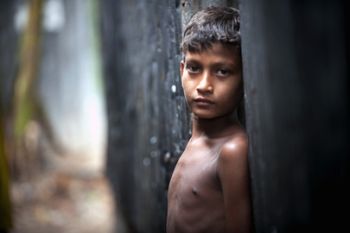
A child in Dhaka's Karial slum, Bangladesh. Activists say a true green economy would embrace economic justice. Credit: UN Photo/Kibae Park
U.N. Secretary-General Ban Ki-moon said last week the international community needs to reach consensus on an inclusive green economy “that will lift people from poverty and protect the global environment”.
This, he pointed out, requires international collaboration. But it also requires investment, funding, shared experiences and technology transfers.
A key theme of the UNCSD, also known as Rio+20 and scheduled to take place in Rio de Janeiro Jun. 20-22, will be the integration of a “green economy” into the larger concept of sustainable development.
So what is a green economy? asks WDM, a UK-based non-governmental organisation (NGO) focusing on a global anti-poverty campaign.
“A true green economy would embrace economic justice – the right of poor communities to determine their own path out of poverty, and an end to harmful policies which put profit before people and the environment.”
It would also end “our obsession with economic growth and unsustainable consumption and replace these with a focus on how everyone’s needs can be met in a truly sustainable manner”.
Asked if funding will also be part of the problem in implementing a green economy, WDM’s Scrivener told IPS that funding is only part of the broader problem with the way Rio+20 is shaping up, “which is the lack of solid commitments being made on the part of industrialised countries”.
While the original draft plan of action released in January was vague and failed to include much in the way of concrete commitments, he said, indications from the subsequent negotiations are that the document has been further watered down.
Without specifics, such as the provision of funding to facilitate developing countries implementation of green policies or a concrete timetable for the elimination of fossil fuel subsides, the Rio+20 outcome document risks being a bland statement of generalities, he added.
WDM points out that industrialised countries like the UK, alongside banks and multinational companies, are using the phrase “green economy” as a smokescreen to hide their plan to further privatise the global commons and create new markets for the services nature provides for free.
“Out of this Trojan horse will spring new market-based mechanisms that will allow the financial sector to gain more control of the management of the global commons,” the group warns.
Instead of contributing to sustainable development and economic justice, this “corporate green economy” would lead to the privatisation of land and nature by multinational companies, taking control of these resources further away from the communities which depend on them, WDM said.
Asked if it was realistic whether the Green Climate Fund would reach the targeted 100 billion dollars by 2020, Scrivener said, “Not credible at all.”
The lack of public funds has become something of a standard excuse rolled out by industrialised countries to justify either not meeting climate finance targets or to attempt to use private money to make up the gap, he added.
“The reality is that, while the sovereign debt crisis in Europe has certainly increased pressure on the availability of public funds, the opportunity to explore new sources of public funding for climate finance has been completely missed,” he said.
For example, he said, the idea of introducing global taxes on the heavily polluting aviation and shipping sectors – first floated at the Copenhagen climate talks back in 2009 – has been quietly forgotten, when the money raised from this measure alone could easily make up the public finance gap.



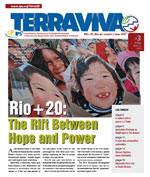
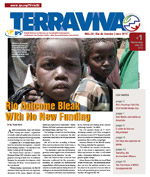
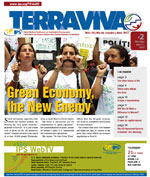

 Add to Google
Add to Google




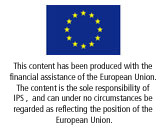



Pingback: Spotlight G-20 & Rio+20: What We’re Reading and Writing » TripleCrisis